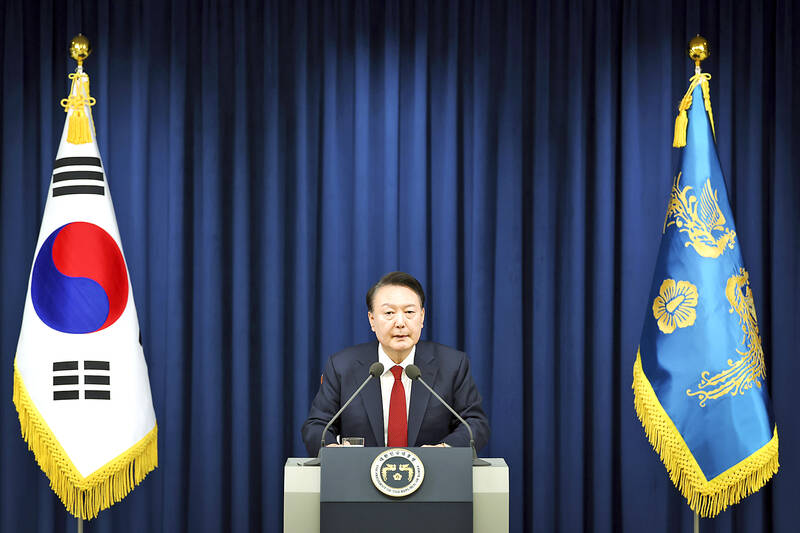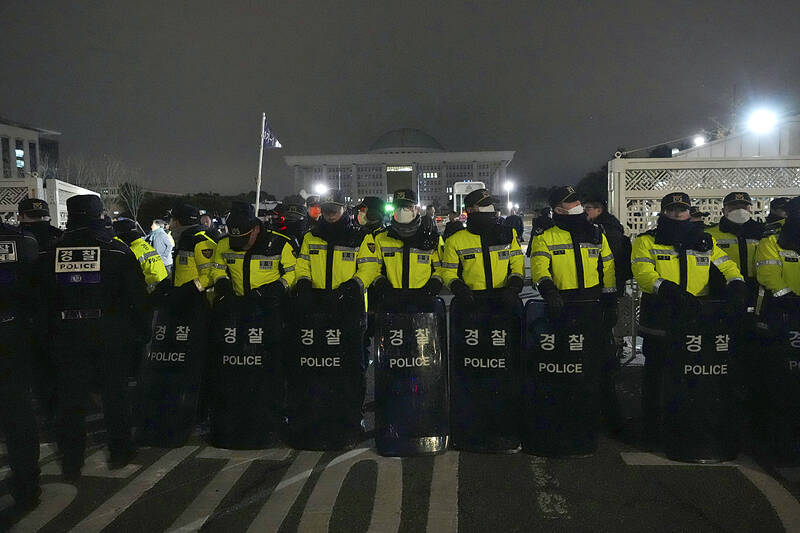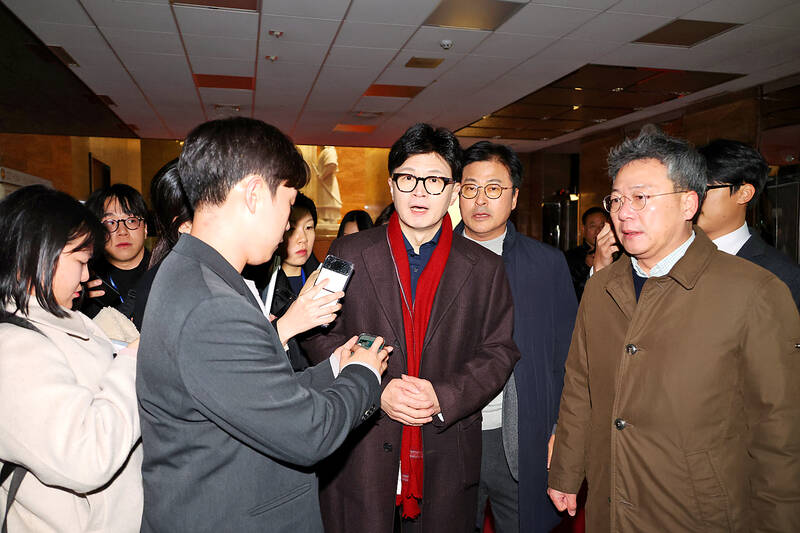South Korean President Yoon Suk-yeol yesterday declared emergency martial law, accusing the opposition of being “anti-state forces intent on overthrowing the regime” amid parliamentary wrangling over a budget bill.
“To safeguard a liberal South Korea from the threats posed by North Korea’s communist forces and to eliminate anti-state elements plundering people’s freedom and happiness, I hereby declare emergency martial law,” Yoon said in a live televised address to the nation.
“With no regard for the livelihoods of the people, the opposition party has paralysed governance solely for the sake of impeachments, special investigations, and shielding their leader from justice,” he added.

Photo: AP
The surprise move comes as Yoon’s People Power Party and the main opposition Democratic Party continue to bicker over next year’s budget bill. Opposition MPs last week approved a significantly downsized budget plan through a parliamentary committee.
The opposition has slashed approximately 4.1 trillion won (US$2.8 billion) from Yoon’s proposed 677 trillion won budget plan, cutting the government’s reserve fund and activity budgets for Yoon’s office, the prosecution, police and the state audit agency.
“Our National Assembly has become a haven for criminals, a den of legislative dictatorship that seeks to paralyze the judicial and administrative systems and overturn our liberal democratic order,” Yoon said.

Photo: AP
Yoon, a former prosecutor, accused opposition lawmakers of cutting “all key budgets essential to the nation’s core functions, such as combatting drug crimes and maintaining public security... turning the country into a drug haven and a state of public safety chaos.”
The president went on to label the opposition, which holds a majority in the 300-member parliament, as “anti-state forces intent on overthrowing the regime.”
Yoon described the imposition of martial law as “inevitable to guarantee the continuity of a liberal South Korea,” adding that it would not impact the country’s foreign policy.

Photo: EPA
“I will restore the country to normalcy by getting rid of anti-state forces as soon as possible,” he said, without elaborating further other than the martial law in place.
He described the current situation as South Korea “on the verge of collapse, with the National Assembly acting as a monster intent on bringing down liberal democracy.”
With martial law imposed, all military units in the South Korea, which remains technically at war with the nuclear-armed North Korea, have been ordered to strengthen their emergency alert and readiness postures, Yonhap news agency reported.
All political activities are banned in South Korea following the imposition of martial law and all media will be subject to government monitoring, martial law commander Park An-su said in a statement.
“All political activities, including those of the National Assembly, local councils, political parties, and political associations, as well as assemblies and demonstrations, are strictly prohibited,” he said, adding: “All media and publications shall be subject to the control of the Martial Law Command.”
The entrance to the National Assembly has been sealed, and MPs have been barred from entering the building, according to Yonhap.
Helicopters were seen landing on the roof of the building in Seoul, in live television footage aired by broadcasters.
South Korea’s opposition leader Lee Jae-myung denounced the newly imposed martial law as "illegal" and called on the public to gather at the parliament in protest.
"President Yoon Suk-yeol’s illegal imposition of martial law is invalid," Lee, who narrowly lost to Yoon in the 2022 election, said during a live stream. "Please come to the National Assembly now. I am heading there as well," he added, urging citizens to join him in opposing the martial law.
The imposition of emergency martial law comes as Yoon’s approval rating dropped to 19 percent in the latest Gallup poll last week, with many expressing dissatisfaction over his handling of the economy and controversies involving his wife, Kim Keon-hee.

The CIA has a message for Chinese government officials worried about their place in Chinese President Xi Jinping’s (習近平) government: Come work with us. The agency released two Mandarin-language videos on social media on Thursday inviting disgruntled officials to contact the CIA. The recruitment videos posted on YouTube and X racked up more than 5 million views combined in their first day. The outreach comes as CIA Director John Ratcliffe has vowed to boost the agency’s use of intelligence from human sources and its focus on China, which has recently targeted US officials with its own espionage operations. The videos are “aimed at

STEADFAST FRIEND: The bills encourage increased Taiwan-US engagement and address China’s distortion of UN Resolution 2758 to isolate Taiwan internationally The Presidential Office yesterday thanked the US House of Representatives for unanimously passing two Taiwan-related bills highlighting its solid support for Taiwan’s democracy and global participation, and for deepening bilateral relations. One of the bills, the Taiwan Assurance Implementation Act, requires the US Department of State to periodically review its guidelines for engagement with Taiwan, and report to the US Congress on the guidelines and plans to lift self-imposed limitations on US-Taiwan engagement. The other bill is the Taiwan International Solidarity Act, which clarifies that UN Resolution 2758 does not address the issue of the representation of Taiwan or its people in

US Indo-Pacific Commander Admiral Samuel Paparo on Friday expressed concern over the rate at which China is diversifying its military exercises, the Financial Times (FT) reported on Saturday. “The rates of change on the depth and breadth of their exercises is the one non-linear effect that I’ve seen in the last year that wakes me up at night or keeps me up at night,” Paparo was quoted by FT as saying while attending the annual Sedona Forum at the McCain Institute in Arizona. Paparo also expressed concern over the speed with which China was expanding its military. While the US

SHIFT: Taiwan’s better-than-expected first-quarter GDP and signs of weakness in the US have driven global capital back to emerging markets, the central bank head said The central bank yesterday blamed market speculation for the steep rise in the local currency, and urged exporters and financial institutions to stay calm and stop panic sell-offs to avoid hurting their own profitability. The nation’s top monetary policymaker said that it would step in, if necessary, to maintain order and stability in the foreign exchange market. The remarks came as the NT dollar yesterday closed up NT$0.919 to NT$30.145 against the US dollar in Taipei trading, after rising as high as NT$29.59 in intraday trading. The local currency has surged 5.85 percent against the greenback over the past two sessions, central